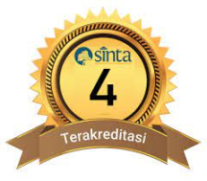Studi komparasi kompetensi siswa sebelum dan sesudah penggunaan bahan ajar ipa terpadu bermuatan literasi saintifik tema kesehatan pencernaan kelas VIII SMPN 8 Padang
Abstract
Full Text:
Download PDFReferences
Kharizmi, M. (2015). Kesulitan Siswa Sekolah Dasar dalam Meningkatkan Kemampuan Literasi. Jupendas, 2 (2), 11-21.
Kurnianingsih, I., Rosini., dan Ismayati, N. (2017). Upaya Peningkatan Kemampuan Literasi Digital bagi Tenaga Perpustakaan Sekolah dan Guru di Wilayah Jakarta Pusat Melalui Pelatihan Literasi Informasi. Jurnal Pengabdian kepada Masyarakat, 3 (1), 61-76..
Shafa. 2014. Karakteristik Proses Pembelajaran Kurikulum 2013. Dinamika Ilmu. 4 (1), 81-96.
Afradisca, E., Asrizal, A., dan Yurnetti, Y. (2018). Bahan Ajar Sains Terpadu Tematik untuk Meningkatkan Kecerdasan Kuantum dan Literasi Saintifik Siswa SMP Kelas VIII. Jurnal Semesta, 1 (1), 18-28.
Asrizal, A., Amran, A., Ananda, A., Festiyed, F., Khairani, S. (2018). Effectiveness Of Integrated Science Instructional Material On Pressure In Daily Life Theme To Improve Digital Age Literacy Of Students. Journal of Physics: Conf. Series 1006.
Daryanto, D. (2014). Pembelajaran Tematik Terpadu Terintegrasi Kurikulum 2013. Yog-yakarta: Gava Media.
Rusman, R. (2017). Belajar dan Pembelajaran Berorientasi Standar Proses Pendidikan. Jakarta: PT Kharisma Putra Utama.
Suherman, E. (2008). Model Belajar dan Pembelajaran Berorientasi Kompetensi Siswa. Educare Jurnal Pendidikan dan Budaya, 5 (2), 1-30.
Dobson, G. (2003). A Guide to Writing Competency Based Training Materials. Commonwealth of Australia: National Volunteer Skills Centre.Oktober 2003.
Desnita, D., Raihanati, R., dan Leonda, M. A. (2014). Strategi Penyusunan Workshop Penyusunan Bahan Ajar Fisika Berbasis Problem Based Learning Bagi Guru SMA/MA, Prosiding Seminar Nasional Fisika (E-Journal),190-195.
Asrizal, A., Amran, A., Ananda, A., Festiyed, F., Sumarmin., R. (2018). The Development Of Integrated Science Instructional Materials To Improve Students Digital Literacy In Scientific Approach. Jurnal Pendidikan IPA Indonesia, Doi: 10.15294/JPII.V7i4.13613.
Marfu’i, L. N. R. (2016). Upaya Pendukung Pembelajaran Literasi Dengan Mengasah Kemampuan Berpikir Kritis Melalui Teknik Bibliolearning Pada Siswa, Jurnal Ilmiah Mitra Swara Ganesha, 3 (2), 1-18.
UNESCO. (2006). Understanding of Literacy Chapter 6, Education for All Global Monitoring Report.
Irianto, P. O., dan Febrianti, L. Y. (2017). Pentingnya Penguasaan Literasi bagi Generasi Muda dalam Menghadapi MEA, The 1st Edu-cation and Language International Conference Proceedings Center for International Language Development of Unissul., May 2017, 640-647
Huynh, A., dan Do, A. (2017). Digital Literacy in a Digital Age: A Discussion Paper. brook-fieldinstitute.ca.
NCREL and Metiri Group. (2003). Engauge 21st Century Skills : Literacy in The Digital Age. www.ncrel.org/engauge
Yuliati, Y. (2017). Literasi Sains dalam Pem-belajaran IPA., Jurnal Cakrawala Pendas., 3 (2). 21-28.
Selisne, M. (2017). Pengembangan Bahan Ajar IPA Terpadu Materi Struktur Jaringan dan Kesehatan Pencernaan untuk Me-ningkatkan Literasi Saintifik Siswa SMP Kelas VIII. Skripsi. UNP
Sugiyono, S. (2012). Metode Penelitian Kuan-titatif, Kualitatif, dan R & D. Bandung: Afabeta.
Trianto, T. (2015). Model Pembelajaran Ter-padu. Jakarta: Bumi Aksara.
DOI: http://dx.doi.org/10.24036/4893171074








